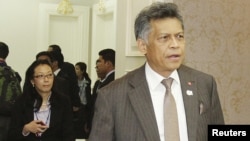The head of the Association of Southeast Asian Nations is warning that ongoing sectarian violence in western Burma could radicalize minority Rohingya Muslims and threaten the stability of the region.
ASEAN Secretary-General Surin Pitsuwan called for the international community to intervene in Burma's western Rakhine state, where dozens have been killed and tens of thousands displaced in the latest outbreak of fighting between Buddhists and Muslims.
"ASEAN can certainly spearhead a humanitarian engagement just to help the people to relieve the pressure, to relieve the suffering and the pain," he said. "Then there are other issues, that is beyond ASEAN that has to be taken up by the international community, by the global institution like the UN. It's the issue of political reconciliation inside. The world must encourage the issue of constitutionality.''
Surin said the 10-nation bloc is in a position to offer aid to Burma, but unless the situation is resolved quickly, Burma's 1.5-million Rohingyas could become radicalized, something he says could jeopardize the economic security of South and East Asia.
The United Nations says 22,000 people have been displaced since last week in western Rakhine state. The Burmese government says the fighting has left more than 2,800 houses burned and 67 people dead.
Human Rights Watch fears the death toll is far higher, based on the accounts of witnesses fleeing the fighting, which it says has disproportionately targeted Muslims.
The U.N. said last week that the violence threatens to undermine the reforms enacted by Burma's new nominally civilian government. It called on Burmese authorities to bring lawlessness and vigilante attacks under control and to put a stop to threats and extremist rhetoric.
ASEAN Secretary-General Surin Pitsuwan called for the international community to intervene in Burma's western Rakhine state, where dozens have been killed and tens of thousands displaced in the latest outbreak of fighting between Buddhists and Muslims.
"ASEAN can certainly spearhead a humanitarian engagement just to help the people to relieve the pressure, to relieve the suffering and the pain," he said. "Then there are other issues, that is beyond ASEAN that has to be taken up by the international community, by the global institution like the UN. It's the issue of political reconciliation inside. The world must encourage the issue of constitutionality.''
Surin said the 10-nation bloc is in a position to offer aid to Burma, but unless the situation is resolved quickly, Burma's 1.5-million Rohingyas could become radicalized, something he says could jeopardize the economic security of South and East Asia.
The United Nations says 22,000 people have been displaced since last week in western Rakhine state. The Burmese government says the fighting has left more than 2,800 houses burned and 67 people dead.
Human Rights Watch fears the death toll is far higher, based on the accounts of witnesses fleeing the fighting, which it says has disproportionately targeted Muslims.
The U.N. said last week that the violence threatens to undermine the reforms enacted by Burma's new nominally civilian government. It called on Burmese authorities to bring lawlessness and vigilante attacks under control and to put a stop to threats and extremist rhetoric.





